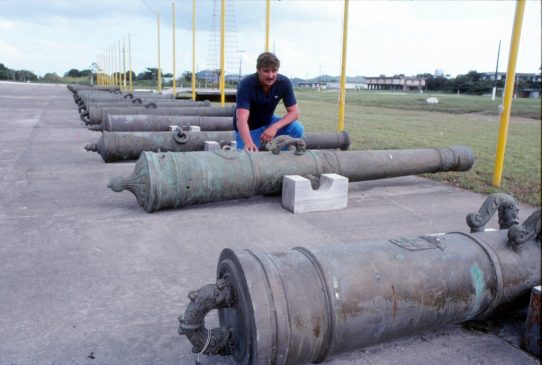Famed Explorer Sir Robert Marx to Discuss Brazil Discoveries Jan. 10 at Florida Tech
Free Public Lecture Starts at 7 p.m. at Gleason Performing Arts Center
MELBOURNE, FLA. — Explorer and undersea adventurer Sir Robert Marx will discuss his remarkable discoveries from more than three years spent working in Brazil at a free public lecture at 7 p.m. Tuesday, Jan. 10, at Gleason Performing Arts Center on the Florida Institute of Technology campus in Melbourne.
The lecture is hosted by The Honor Society of Phi Kappa Phi.
According to most history books, Brazil was accidentally discovered in 1500 by Pedro Alvares Cabral. The Portuguese explorer was sailing down the west coast of Africa on a voyage between his native country and the Indian Ocean when a fierce storm blew him upon the shores of Brazil.
At least, that was the thinking until Marx discovered a 2nd-century B.C. Roman shipwreck near Rio de Janeiro that indicates the Romans beat Cabral to Brazil by 1,700 years.
That was just one of numerous notable discoveries during Marx’s time in Brazil, from 1979 to 1983. Another was his discovery of the Dutch warship Hollandia, which was the flagship of Piet Heyn, one of the Netherland’s most famous admirals. In 1628, Heyn captured an entire Spanish treasure fleet in Cuba, which had never been done before (and has not been done since). The booty from this event led to the Dutch Republic getting its independence from Spain, which had owned and ruled it for over a century.
This amazing find was made while excavating a British merchantman which was sunk right over Heyn’s ship. While digging on that vessel, Marx’s divers found the Hollandia.
Another interesting find was the Portuguese warship Sacramento, lost in 1668 while entering the Bay of All Saints. Marx and his team raised 62 bronze cannons that had served as armaments on the ship, including ones cast in China, India, Malaysia, Sri Lanka, Japan, the Philippines and elsewhere.
During the years Marx and his team worked in Brazil, they discovered more than 40 other wrecks, mostly Portuguese, Dutch and Spanish. Many of the recoveries ended up in museums in Brazil, Portugal and England.
For more information on the lecture, call 321-674-8096.
###





